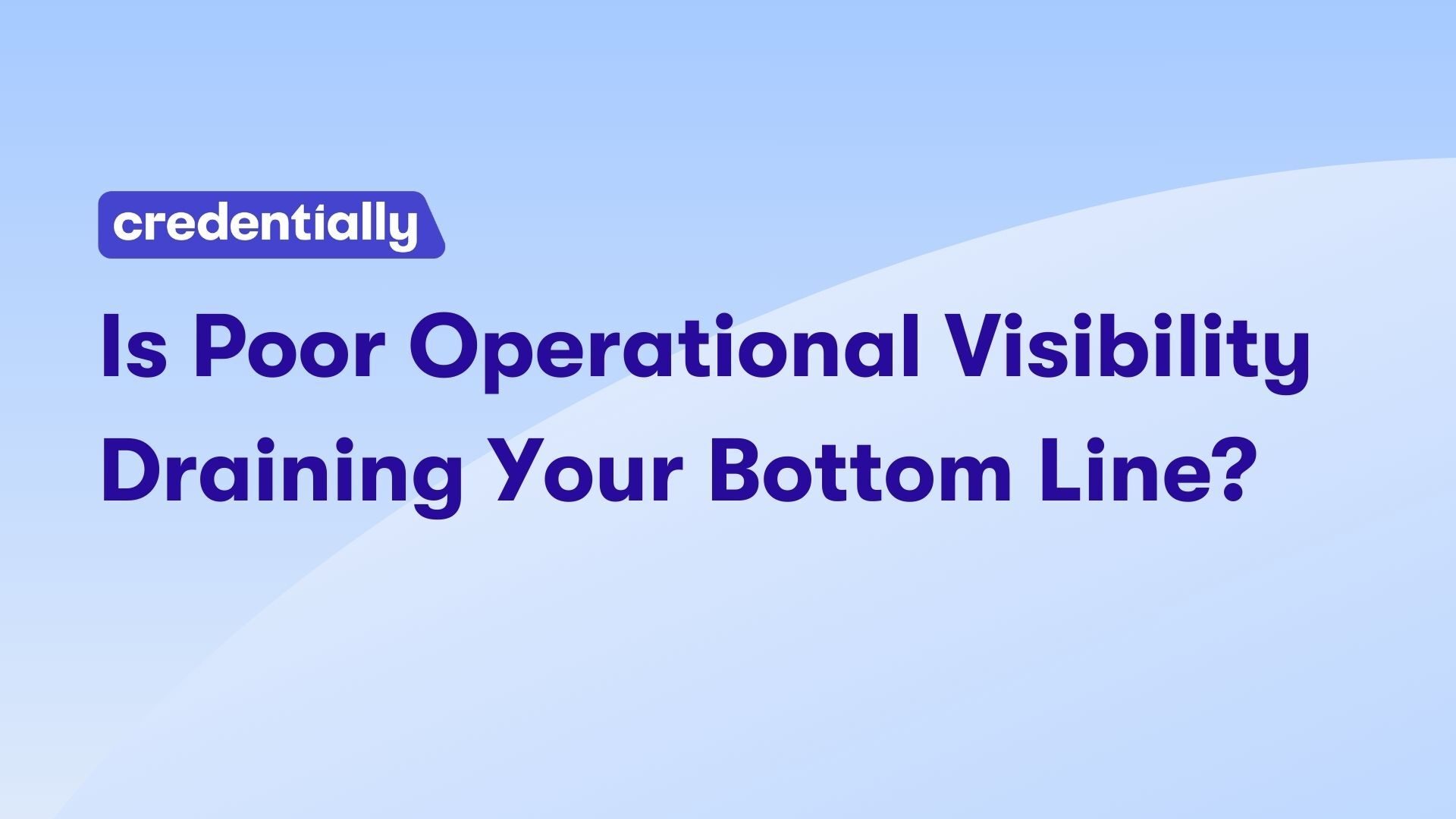
The Hidden Costs of Poor Operational Visibility in Behavioral Health
Behavioral health organizations today face some of the toughest operational pressures in healthcare - a fast-changing regulatory landscape, workforce shortages, rising patient demand, and increasing audit scrutiny.
For many leaders, the immediate focus tends to fall on urgent matters: hiring staff, meeting compliance deadlines, and keeping day-to-day operations afloat. But there’s a deeper issue quietly undermining many organizations: poor operational visibility.
Operational visibility - the ability to see in real time what is happening across compliance, credentialing, onboarding, and workforce management - is no longer a back-office concern. It is a boardroom priority, directly linked to financial health, staff retention, reputation, and long-term survival.
Here’s why ignoring this critical area comes at a steep cost.
Fines and Penalties from Compliance Failures
Behavioral health organizations operate in one of the most heavily regulated sectors of healthcare. According to the U.S. Department of Health and Human Services, HIPAA penalties alone have ranged from $10,000 to over $1 million per incident in recent years. Beyond federal regulations, many organizations must comply with state licensure boards, Medicaid requirements, and accreditation standards like The Joint Commission.
When organizations rely on manual tracking or scattered systems, it becomes easy to miss critical compliance details - an expired clinical license, a missed background check renewal, or a lapsed certification. These failures can trigger financial penalties, lost reimbursement, or even the suspension of services.
As Robert M. Wachter, MD, professor at UCSF and author of The Digital Doctor, has said, “In today’s healthcare environment, compliance failures are no longer local problems. They can ripple across an organization, damaging its finances, reputation, and ability to serve patients”.
Lost Revenue from Slow Credentialing and Onboarding
Onboarding delays are more than administrative frustrations - they are direct revenue losses. Research from the Council for Affordable Quality Healthcare (CAQH) found that manual credentialing processes cost the healthcare industry over $2 billion annually.
Every day a provider is stuck waiting on credentialing is a day they cannot deliver billable care, leaving positions unfilled and patient demand unmet.
Without centralized reporting, it becomes difficult for leaders to monitor where credentialing stands, identify bottlenecks, or intervene proactively. The result is extended onboarding timelines, wasted resources, and reduced access to care.
A 2021 MGMA study reported that practices with automated credentialing systems saw onboarding times reduced by up to 85 percent.
Burnout and Turnover from Overloaded Staff
Administrative complexity is a leading contributor to staff burnout. According to a 2022 survey by the American Medical Association, nearly 50 percent of healthcare workers report symptoms of burnout, with administrative burden cited as a top cause.
When staff are buried in manual data entry, chasing down paperwork, or scrambling to prepare for audits, they are pulled away from higher-value work like patient care and quality improvement. Clinicians experience the downstream effects: unpredictable schedules, gaps in coverage, and increasing frustration. Over time, this erodes morale and contributes to turnover - worsening the very workforce shortages behavioral health leaders are trying to solve.
As Tait Shanafelt, MD, chief wellness officer at Stanford Medicine, has emphasized, “Healthcare systems that fail to address operational inefficiencies are driving away the very people they depend on most”
Audit Failures and Reputational Damage
Audits have become an unavoidable part of healthcare operations. Whether conducted by payers, accrediting bodies, or regulatory agencies, they demand fast, accurate access to records and data. But without centralized, real-time reporting, audit preparation becomes a scramble - pulling clinical and administrative staff off core duties to hunt down documentation.
Incomplete or inconsistent records not only increase the risk of financial penalties but also damage an organization’s reputation with funders, regulators, and the communities they serve. According to a National Committee for Quality Assurance (NCQA) report, organizations that fail audits may face extended remediation periods, loss of accreditation, or restricted contracting opportunities.
In a landscape where reputation is everything, the cost of being unprepared goes far beyond dollars - it can erode trust and undermine long-term viability.
Visibility is a Strategic Imperative, Not Just a Technology Upgrade
Despite these risks, many behavioral health organizations continue to view reporting and visibility as IT or compliance projects, rather than organizational imperatives. But the evidence is clear: organizations that invest in centralized, real-time reporting systems are better positioned to anticipate risks, make faster decisions, improve staff satisfaction, and grow sustainably.
A Deloitte 2023 report on healthcare transformation found that 70 percent of high-performing organizations rank operational visibility as a top strategic priority, linking it to improved financial performance, staff retention, and patient outcomes.
As healthcare futurist Dr. Eric Topol has observed, “Data without visibility is noise. But data transformed into actionable insights becomes the backbone of a resilient, learning healthcare system”.
Ready to Take Action
We’ve created a new whitepaper - The Operational Health Check for Behavioral Health Organizations: Why Visibility and Reporting Are Now Mission-Critical - to help leaders understand not only the risks of poor visibility but also the solutions that can transform operations.
Inside, you’ll discover:
- A deeper dive into the hidden costs outlined here
- The Five Pillars of Operational Health
- A real-world case study of transformation
- Practical steps to build a reporting-first culture
Available soon at credentially.io
Don’t wait for the next audit, compliance breach, or staffing crisis to force change. With better visibility, you can strengthen your operations, protect your organization, and deliver the care your communities rely on.
.svg)
.svg)
.svg)